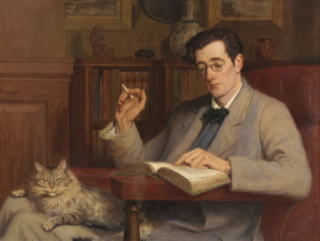Related Research Articles

The River Dargle is a river that flows from the Wicklow Mountains in Ireland to the Irish Sea. It forms Powerscourt Waterfall, receives the Glencree and Glencullen Rivers, and later the Glenmunder Stream / County Brook, and the Swan River at Bray, and reaches the sea at Bray Harbour.

Esmé Stuart Lennox Robinson was an Irish dramatist, poet and theatre producer and director who was involved with the Abbey Theatre.
Events from the year 1978 in Ireland.

Oisín Kelly was an Irish sculptor.
Desmond Hogan is an Irish writer. Awarded the 1977 Rooney Prize for Irish Literature and 1980 John Llewellyn Rhys Prize, his oeuvre comprises novels, plays, short stories and travel writing.
Eoghan Ó Tuairisc was an Irish poet and writer.

Molesworth Street is a street in Dublin, Ireland named after Richard Molesworth, 3rd Viscount Molesworth and links the more notable Dawson Street with Kildare Street and lies just over 200 m to the north of St. Stephens Green in Dublin's central business district.

Francis Johnston was an Irish architect, best known for building the General Post Office (GPO) on O'Connell Street, Dublin.

Marrowbone Lane is a street off Cork Street on the south side of Dublin, Ireland.

Eugene Crean (1854–1939) was an Irish nationalist politician and MP in the House of Commons of the United Kingdom of Great Britain and Ireland and member of the Irish Parliamentary Party 1892–1910, for the All-for Ireland Party 1910–1918.
Shamrock Rovers Football Club is a football club from Dublin, Republic of Ireland. Founded in Ringsend, a southside, inner suburb of Dublin, the club's date of foundation is uncertain and disputed. Between 1926 and 1987 the club played at Glenmalure Park, Milltown. Shamrock Rovers F.C. is Ireland's most successful football club having won the League of Ireland a record 18 times, including four times in a row in the 1980s, along with the FAI Cup a record 24 times, including six times in a row in the 1960s. It was also the first Irish club to participate in a European competition, playing in the European Cup in 1957. Shamrock Rovers was also one of the European club teams that spent the 1967 season in the United States to found the United Soccer Association, representing Boston as the Boston Rovers.

John A. Murphy was an Irish historian and senator. He was professor of history at University College Cork (UCC).
Gene Kerrigan is an Irish journalist and novelist who grew up in Cabra in Dublin. His works include political commentary on Ireland since the 1970s in such publications as Magill magazine and the Sunday Independent newspaper. He has also written about Ireland for International Socialism magazine.
Events from the 9th century in Ireland.
León Ó Broin was an Irish civil servant, known as a writer and playwright. He wrote many plays, stories and historical works in both Irish and English.

The chronology of the Great Famine documents a period of Irish history between 29 November 1845 and 1852 during which time the population of Ireland was reduced by 20 to 25 percent. The proximate cause was famine resulting from a potato disease commonly known as late blight. Although blight ravaged potato crops throughout Europe during the 1840s, the impact and human cost in Ireland – where a third of the population was entirely dependent on the potato for food but which also produced an abundance of other food – was exacerbated by a host of political, social and economic factors which remain the subject of historical debate.
Dublin, Royal Irish Academy, MS 23 N 10, formerly Betham 145, is a Gaelic–Irish medieval manuscript.

Hume Street is a street in central Dublin located between Ely Place and St. Stephen's Green. It is named after Sir Gustavus Hume, 3rd Baronet (c.1670–1731) and his family.
Tony Humphreys is an Irish educator, a consultant clinical psychologist, the founder of the Relationship Mentoring modality of Psychotherapy and the author of eleven self-help books translated into 15 languages and available in 28 countries. They notably include A Different Kind of Teacher, Self-esteem: the Key to your Child's Future (1995), The Power of "Negative" Thinking (1996), Children Feeling Good (1998) and ‘'Relationship, Relationship, Relationship: The Heart of a Mature Society'’ (2010).
Thomas Joseph Walsh was an Irish doctor, writer, and founder and director of the Wexford Opera Festival.
References
- ↑ Tonkin, Boyd (18 June 2009). "Transit, by Bernard Share". The Independent. Retrieved 10 March 2016.
- ↑ "Catalogue of Dalkey Archive Press, the John F. Byrne Irish Literature Series". Dalkey Archive Press. 17 April 2018.
- ↑ "A Tribute to Bernard Share". Publishing Ireland. 2 October 2013. Archived from the original on 27 May 2015. Retrieved 10 March 2016.